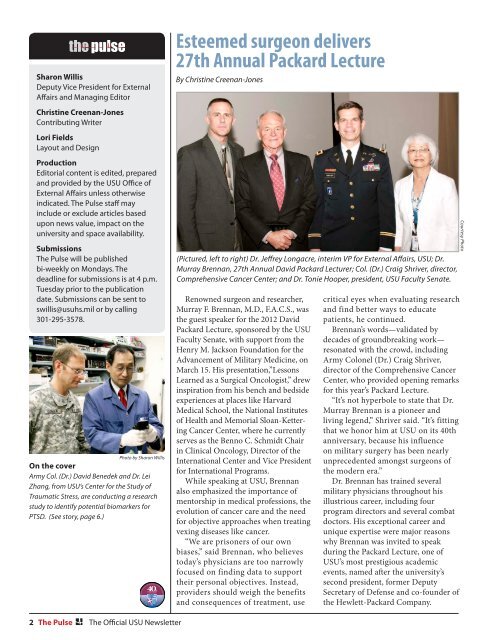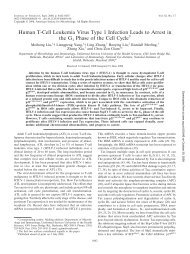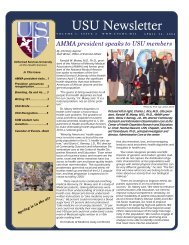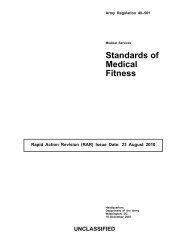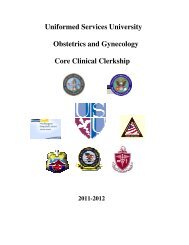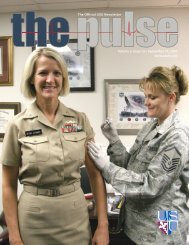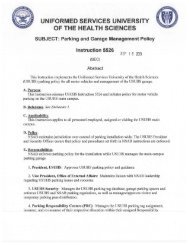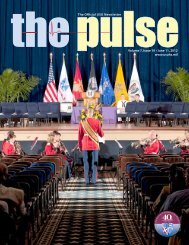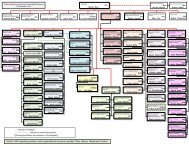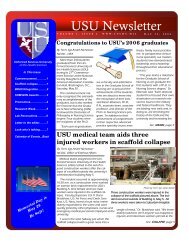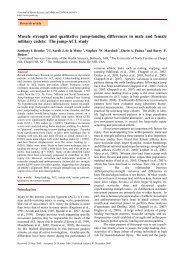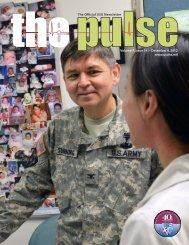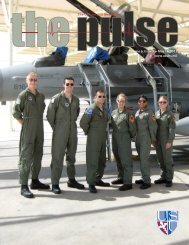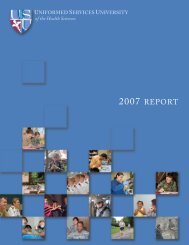Understanding PTSD - Uniformed Services University of the Health ...
Understanding PTSD - Uniformed Services University of the Health ...
Understanding PTSD - Uniformed Services University of the Health ...
Create successful ePaper yourself
Turn your PDF publications into a flip-book with our unique Google optimized e-Paper software.
Sharon Willis<br />
Deputy Vice President for External<br />
Affairs and Managing Editor<br />
Christine Creenan-Jones<br />
Contributing Writer<br />
Lori Fields<br />
Layout and Design<br />
Production<br />
Editorial content is edited, prepared<br />
and provided by <strong>the</strong> USU Office <strong>of</strong><br />
External Affairs unless o<strong>the</strong>rwise<br />
indicated. The Pulse staff may<br />
include or exclude articles based<br />
upon news value, impact on <strong>the</strong><br />
university and space availability.<br />
Submissions<br />
The Pulse will be published<br />
bi-weekly on Mondays. The<br />
deadline for submissions is at 4 p.m.<br />
Tuesday prior to <strong>the</strong> publication<br />
date. Submissions can be sent to<br />
swillis@usuhs.mil or by calling<br />
301-295-3578.<br />
Photo by Sharon Willis<br />
On <strong>the</strong> cover<br />
Army Col. (Dr.) David Benedek and Dr. Lei<br />
Zhang, from USU’s Center for <strong>the</strong> Study <strong>of</strong><br />
Traumatic Stress, are conducting a research<br />
study to identify potential biomarkers for<br />
<strong>PTSD</strong>. (See story, page 6.)<br />
2 The Pulse The Official USU Newsletter<br />
Esteemed surgeon delivers<br />
27th Annual Packard Lecture<br />
By Christine Creenan-Jones<br />
(Pictured, left to right) Dr. Jeffrey Longacre, interim VP for External Affairs, USU; Dr.<br />
Murray Brennan, 27th Annual David Packard Lecturer; Col. (Dr.) Craig Shriver, director,<br />
Comprehensive Cancer Center; and Dr. Tonie Hooper, president, USU Faculty Senate.<br />
Renowned surgeon and researcher,<br />
Murray F. Brennan, M.D., F.A.C.S., was<br />
<strong>the</strong> guest speaker for <strong>the</strong> 2012 David<br />
Packard Lecture, sponsored by <strong>the</strong> USU<br />
Faculty Senate, with support from <strong>the</strong><br />
Henry M. Jackson Foundation for <strong>the</strong><br />
Advancement <strong>of</strong> Military Medicine, on<br />
March 15. His presentation,”Lessons<br />
Learned as a Surgical Oncologist,” drew<br />
inspiration from his bench and bedside<br />
experiences at places like Harvard<br />
Medical School, <strong>the</strong> National Institutes<br />
<strong>of</strong> <strong>Health</strong> and Memorial Sloan-Kettering<br />
Cancer Center, where he currently<br />
serves as <strong>the</strong> Benno C. Schmidt Chair<br />
in Clinical Oncology, Director <strong>of</strong> <strong>the</strong><br />
International Center and Vice President<br />
for International Programs.<br />
While speaking at USU, Brennan<br />
also emphasized <strong>the</strong> importance <strong>of</strong><br />
mentorship in medical pr<strong>of</strong>essions, <strong>the</strong><br />
evolution <strong>of</strong> cancer care and <strong>the</strong> need<br />
for objective approaches when treating<br />
vexing diseases like cancer.<br />
“We are prisoners <strong>of</strong> our own<br />
biases,” said Brennan, who believes<br />
today’s physicians are too narrowly<br />
focused on finding data to support<br />
<strong>the</strong>ir personal objectives. Instead,<br />
providers should weigh <strong>the</strong> benefits<br />
and consequences <strong>of</strong> treatment, use<br />
critical eyes when evaluating research<br />
and find better ways to educate<br />
patients, he continued.<br />
Brennan’s words—validated by<br />
decades <strong>of</strong> groundbreaking work—<br />
resonated with <strong>the</strong> crowd, including<br />
Army Colonel (Dr.) Craig Shriver,<br />
director <strong>of</strong> <strong>the</strong> Comprehensive Cancer<br />
Center, who provided opening remarks<br />
for this year’s Packard Lecture.<br />
“It’s not hyperbole to state that Dr.<br />
Murray Brennan is a pioneer and<br />
living legend,” Shriver said. “It’s fitting<br />
that we honor him at USU on its 40th<br />
anniversary, because his influence<br />
on military surgery has been nearly<br />
unprecedented amongst surgeons <strong>of</strong><br />
<strong>the</strong> modern era.”<br />
Dr. Brennan has trained several<br />
military physicians throughout his<br />
illustrious career, including four<br />
program directors and several combat<br />
doctors. His exceptional career and<br />
unique expertise were major reasons<br />
why Brennan was invited to speak<br />
during <strong>the</strong> Packard Lecture, one <strong>of</strong><br />
USU’s most prestigious academic<br />
events, named after <strong>the</strong> university’s<br />
second president, former Deputy<br />
Secretary <strong>of</strong> Defense and co-founder <strong>of</strong><br />
<strong>the</strong> Hewlett-Packard Company.<br />
Courtesy Photo


